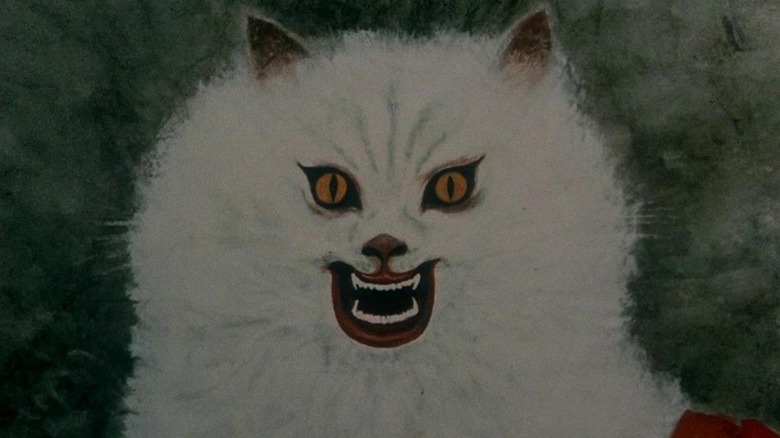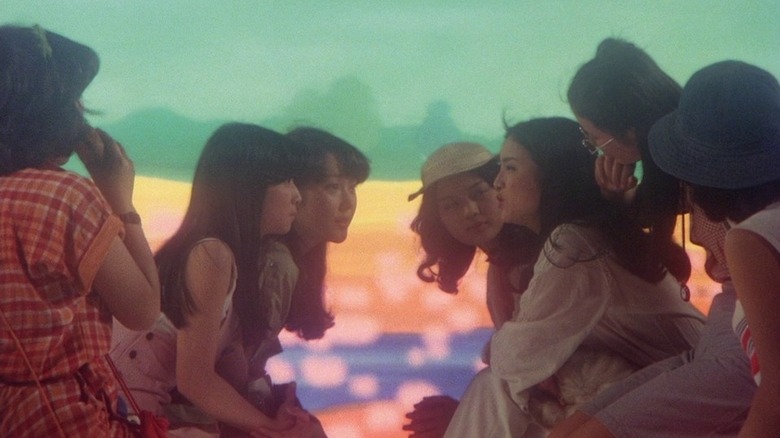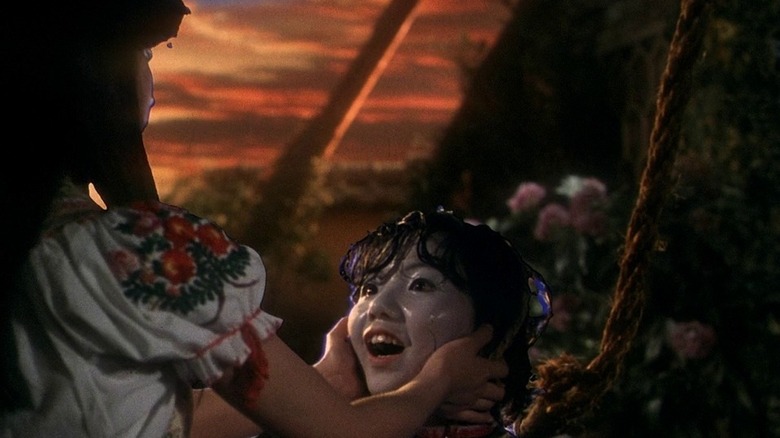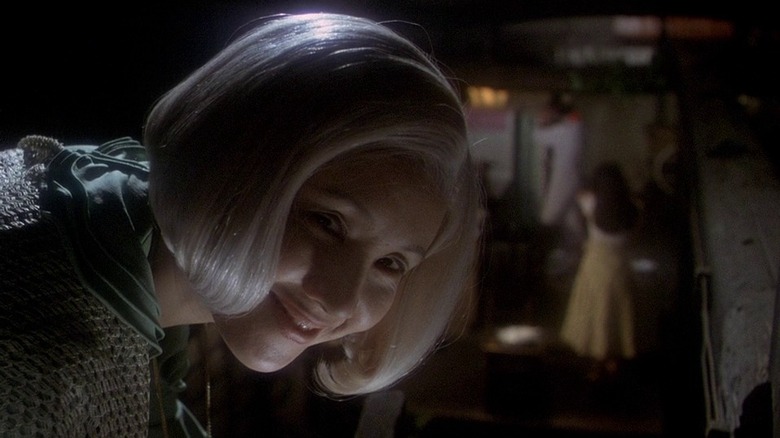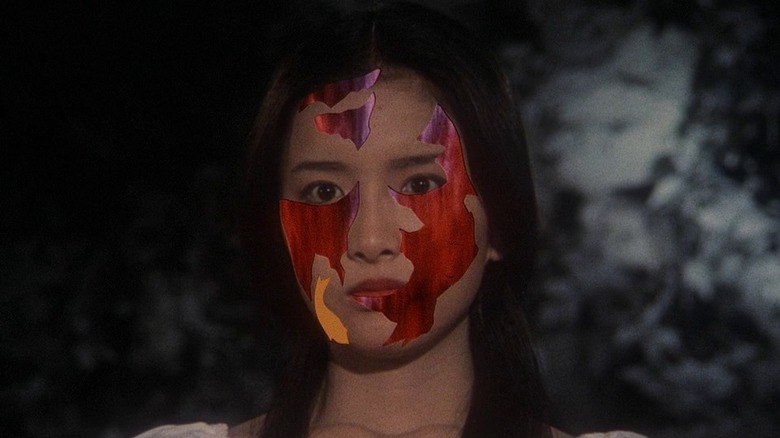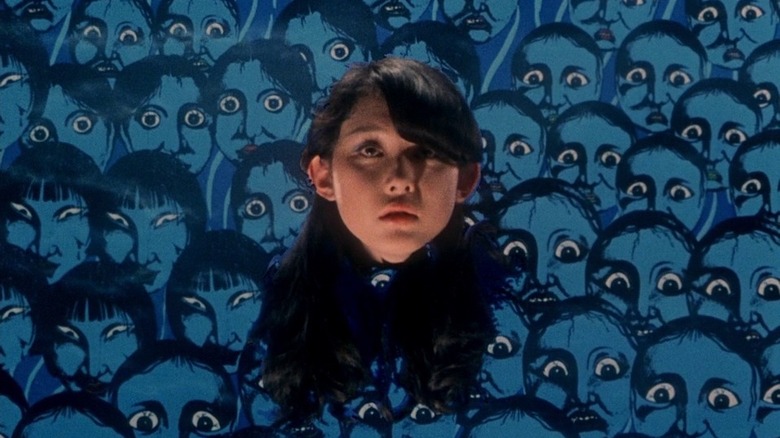The Daily Stream: In The Beautiful, Bizarre Blockbuster Hausu, A Teenage Girl Is Eaten By A Piano
(Welcome to The Daily Stream, an ongoing series in which the /Film team shares what they've been watching, why it's worth checking out, and where you can stream it.)
The Movie: "Hausu"
Where You Can Stream It: Criterion Channel
The Pitch: A gorgeous teenage girl named Gorgeous becomes upset when her father brings home his fiancée one night. In an act of rebellion, she goes to visit her distant aunt, who lives in an old house in the countryside. Six friends come along for the ride. Prof is smart and wears glasses; Fantasy dreams of one day marrying her teacher Mr. Togo; Melody likes to play instruments; Sweet is sweet; Kung Fu knows martial arts and has her own theme song; Mac likes to eat. Over the course of one night, each of these girls will meet their doom at the paws of a fluffy white cat, while memories of past grief fester in the walls.
Sorry, let's try that again. This is a movie where: A teenage girl is eaten by a piano! A man turns into a pile of bananas! A girl named Kung Fu fights household appliances, and then a ghost! That's "Hausu," baby!!
Why it's essential viewing
In 1975, Steven Spielberg changed cinematic history with "Jaws." While members of the cast and crew were convinced the film would be a disaster, it instead became the first Hollywood summer blockbuster. Across the ocean, film producers in Japan began to wonder: What would it take to produce their own "Jaws?" Television was rapidly stealing their audience. Their only hope was to give the public something so expensive, outrageous and exciting that it could only work on the big screen.
Meanwhile, a director named Nobuhiko Obayashi was busy making commercials. According to an interview with Obayashi on the Criterion Channel, many talented directors at the time refused to direct commercials, which they saw as beneath them. Obayashi himself had no such qualms. The film of his dreams, the domestic epic "Hanagatami," stood no chance of being produced in the industry of that time. But commercials were allocated large budgets, allowing for fully realized images that might otherwise have been seen as expensive or impractical. Commercials "may have had no meaning," Obayashi says, "but being able to show a beautiful blue sky seemed wonderful on an artistic level." When Toho came to Obayashi asking for a script to a big populist film in the vein of "Jaws," Obayashi was ecstatic. With Toho's resources, he could imagine the biggest and bluest sky audiences had ever seen.
The death of Japanese cinema
Obayashi asked his own young daughter what she would want to see in a movie. Her first response was, "don't bother — Japanese movies are boring." After considering the question further, she said that "it would be scary if my reflection in the mirror began attacking me." This is exactly the kind of detail Obayashi was looking for. In his mind, "the power of cinema isn't in the explainable, but in the strange and inexplicable." Children and teenagers, he believed, wouldn't be satisfied by a simple animal or a killer. They wanted something that tapped into their own deep-rooted fears and anxieties, even the ones that might appear silly in the light of day. At the time, his daughter was bothered by annoying piano lessons, heavy futons, and ticking grandfather clocks. So Obayashi put them in the movie.
When Obayashi and the scriptwriter Chiho Katsura turned in the script for "Hausu," their connections at Toho praised their work. Unfortunately, they said, every director who read the script had turned it down, fearing that "making such a ludicrous film would end their career." Obayashi volunteered to direct the movie himself, but he lacked a contract with Toho. "Hausu" remained in stasis for the time being. Still, Obayashi refused to give up. His connections in the media, who adored his earlier short film "Emotion," promoted the film in their magazines. The seven young actresses chosen for the film appeared in countless model shoots. There were novelizations, a late-night radio drama and a soundtrack album, all before production of "Hausu" had even begun. When the film became a smash hit on its release, the producers at Toho were convinced: If the public wanted shameless dreck like this, Japanese cinema was well and truly dead.
Keyboard cat
The directors of Obayashi's time were right to believe that the script was thin gruel. What they did not foresee is how Obayashi and his crew would choose to interpret that script. "Hausu" is a non-stop assault of cinematic technique. Every single scene trots out a new trick: giant painted sets, camera pans, animation, freeze-frames, footage rewound and fast forwarded. "Hausu" constantly breaks its own narrative and cinematic rules to give the audience something delightful and unexpected. The film even makes jokes at its own expense, like in an early scene where Gorgeous's ghostly aunt breaks the fourth wall to smile directly into the camera. Shortly after, her fluffy cat Blanche meows along to the theme song of the movie while walking back and forth on a piano. Yes, "Hausu" predicted goofy YouTube cat videos in 1977.
The most consistent aspect of "Hausu" is its own artificiality. Its special effects are so memorable not because they capture the appeal of life, but because they firmly reject realism and consistency. Many scenes throughout the film display heavy artifacting, outlining actors and scenery in a blue haze. Obayashi was no fool; he knew what "good" cinematography looked like. As a film fanatic he held the work of directors Akira Kurosawa and Yasujiro Ozu close to his heart. Yet his guiding principle during the production of "Hausu," according to his interview with Criterion, was that "if Kurosawa or Ozu were to see it, what kind of direction would offend them the most?"
"Hausu" was to be made specifically for a new generation who no longer cared about the distinction between real life and the movies. A film like that could not be made by following Ozu's script.
A fantasy of the atomic bomb
If "Hausu" was merely an extravaganza of bizarre visual effects and cinematographic techniques, that would be enough to cement its legacy as a cult film. Of course, there is another way to read "Hausu," as explained by Kogonada in Criterion's feature "House; Trick or Truth." Obayashi was born in the prefecture of Hiroshima, and his own father served as a doctor in the war. "All my childhood friends died because of the bomb," he would say, "so I wanted to write a fantasy with the atomic bomb as a theme." The spirit of Gorgeous's aunt is tormented by the memory of her husband who died in the war. She turns that bitterness on her young visitors, who dance through life without ever considering the suffering that befell their parents. When a mushroom-shaped cloud is glimpsed in an early flashback, all Gorgeous and her friends can think of is cotton candy. A delicious fluffy white cloud, much like the "witch's cat" Blanche.
"Hausu" was released the same year as "Suspiria," another great horror film beloved for its amazing lighting and art design. "Suspiria" finds a similar balance between humor and menace, threatening its cast of young actors with an occult force that defies understanding. But there's a sense of melancholy in "Hausu" that "Suspiria" lacks. The characters of "Hausu" are gimmicks, but their loss of innocence is taken seriously. The most shocking moment in the film isn't a death sequence, but instead the moment that Gorgeous looks into a mirror to see her aunt's reflection replacing her own. The mirror shatters, Gorgeous's face breaks apart like glass, and she becomes a burning silhouette. The "evil reflection" Obayashi's daughter imagined is transformed into something stranger and sadder.
Hausu is a movie
Which is the real "Hausu?" A childishly enthusiastic parade of chintzy special effects? A deceptively haunting tale of Japanese teenagers consumed by the aftereffects of the bomb? Well, it's both. "Hausu" is an optical illusion. Look at it one way, and one movie presents itself. Look at it from another angle, and its doppelganger appears. Rather than one superseding the other, the two exist happily in a symbiotic relationship. It is this characteristic that makes "Hausu" so great, even though it was hated by the critics of its time. Examine the film with any lens you please, and you will be rewarded.
Decades into what became a long and fruitful career, Obayashi finally made his dream project "Hanagatami." The film touches on themes that recur throughout his work, such as childhood innocence, the pointlessness of war and the destructive impact of violence on families and friendships. Critics agreed that Obayashi had made his masterpiece.
Yet outside of Japan, Obayashi may always be known as the director of "Hausu." Another director might resent that fate. But I get the impression that Obayashi, who passed away in 2020, may not have minded that his silly film about a ghost cat and a haunted house made his name abroad. The cast and crew of "Hausu" went into production knowing that what they were making was nothing more or less than (as the film's subtitle reads) "a movie." But when given the resources to depict a proper big blue sky on screen, in the middle of a cinematic famine, why not go all out? "Hausu" may not adhere to the standards set by Kurosawa and Ozu, but bears every mark of having been made with love.
